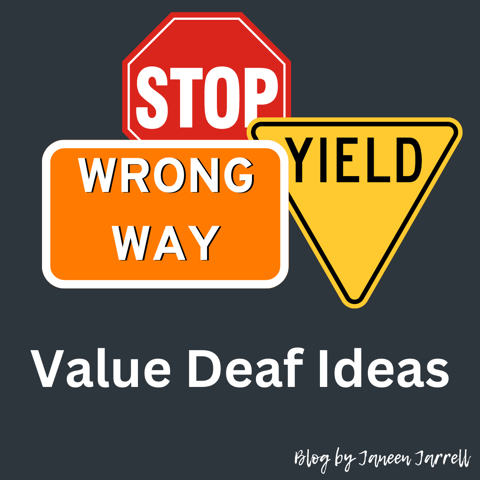Deaf Ideas Matter
Have you ever driven down a road with “stop,” “yield,” and even “one way” or “wrong way” signs? You wouldn’t drive down such a road very long, would you? Especially if you had no or limited confidence in where it was leading. You might choose to pick a different road, or maybe pull over and park your car.
Deaf and Hard-of-Hearing children get this every day.
Little children have lots of thoughts in their heads. In between the silly is practice, and even some not-so-silly ideas if they’re brave enough, or confident enough, to express them. They may be asking what is, or where is, how is, or why is. This is how they learn. If they don’t get answers to their questions then they stop asking. If they don’t get validation to their babbling, whether it be spoken or signed, they stop learning.
If they are told that they are not putting their ideas out in the right way or at the right speed, they will simply stop. If they are interrupted they will stop trying to communicate. If someone walks over them because they are faster or if people don’t have time to pay attention to what they are saying, they will stop.
These are thoughts that came to me during a recent stroke that affected my ability to share thoughts. I have the advantage of being 56, and having spoken, written, signed, or typed language to work with. I have synonyms if the right word doesn’t want to come out. I am old enough (and young enough) that people still want to know what I think (or they pretend very well).
A deaf child doesn’t have those advantages.
It is tough being trapped in your own self when you have thoughts to express and can’t get them out. Children have many wonderful thoughts and ideas bouncing around in their heads. If it is more important that your child put out their thoughts in the right way or speed, their thoughts may go unknown and they stop trying to express ideas. That would be a shame – imagine what we miss because we’ve taught others they have nothing of value to say.
Even the non-sensical has value, if only to connect two or more people. One grandmother talked about communicating with her granddaughter. Her ideas and the joy that comes with her expressing creativity, and what it means to be able to receive those thoughts and being able to respond back – it’s priceless. It also means when there are serious matters to discuss, grandma & granddaughter have built a trust in communicating.
So I challenge you, whether it makes sense or moves slow, value the thoughts your children express this year – no matter how they express them. Hold your corrections a little bit and let kids be silly once in a while. You may find it precious in the long road ahead.
